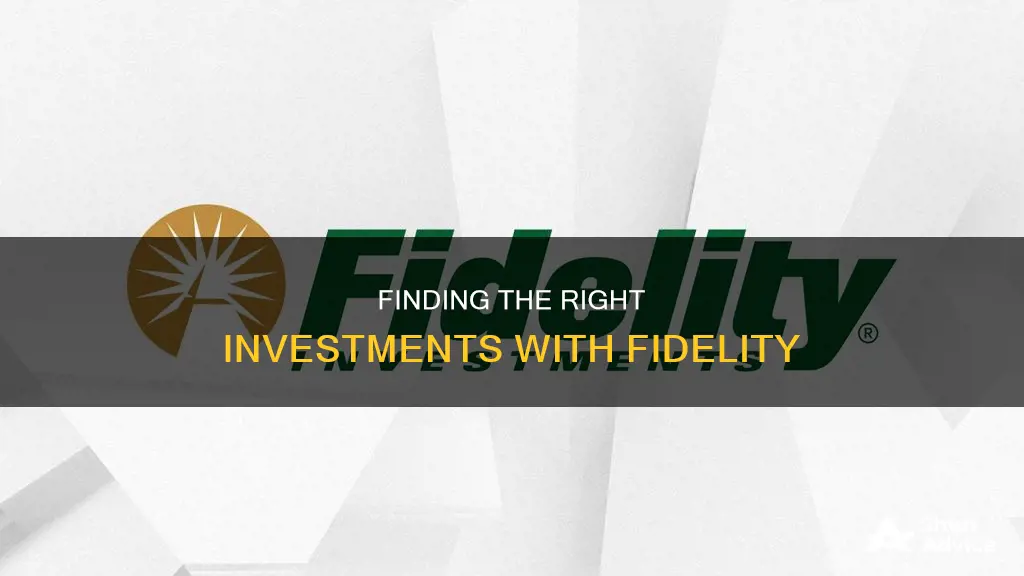
Fidelity offers a wide range of investment options, including stocks, exchange-traded funds (ETFs), mutual funds, bonds, and precious metals. With over 70 years of experience in the industry, Fidelity has the tools and expertise to help investors build a diversified portfolio and achieve their financial goals.
Fidelity's investment choices cover various asset classes, sectors, and markets, allowing investors to tailor their investments to their specific needs and goals. The company also provides resources and support for beginners, making it easier to navigate the complex world of investing.
Additionally, Fidelity offers retirement planning services, cash management products, and dedicated advisor services, ensuring that investors have the necessary tools and guidance to make informed decisions.
With a focus on making financial expertise accessible, Fidelity aims to help individuals grow their wealth and secure their future.
| Characteristics | Values |
|---|---|
| Investment options | Commission-free stock and ETF trades, stocks, mutual funds, bonds, CDs, precious metals, crypto, etc. |
| Investment tools | Fidelity Youth Account, Fidelity Basket Portfolios, Fidelity Learning Center, Virtual Assistant, etc. |
| Investment research | Industry-leading research, Morningstar® highly rated funds, Fidelity Total Bond Fund, etc. |
| Investment accounts | Brokerage account, 401(k), Individual Retirement Account (IRA), Fidelity Account®, Fidelity Roth IRA, etc. |
What You'll Learn
- Investment types: stocks, ETFs, mutual funds, bonds, precious metals, and cryptocurrencies
- Brokerage accounts: flexibility, accessibility, and tax implications
- (k) accounts: tax advantages, employer contributions, and rules
- Individual retirement accounts (IRAs): tax benefits, flexibility, and eligibility
- Picking investments: individual stocks and bonds, mutual funds or ETFs, and professional advisors

Investment types: stocks, ETFs, mutual funds, bonds, precious metals, and cryptocurrencies
Fidelity offers a wide range of investment options to its customers, including stocks, exchange-traded funds (ETFs), mutual funds, bonds, precious metals, and cryptocurrencies. Each of these investment types offers unique advantages and suits different investment goals, risk tolerances, and financial situations. Here's an overview of each investment type:
Stocks: Fidelity offers comprehensive research and low online commission rates for buying and selling shares of publicly traded companies in both domestic and international markets. With the Fidelity Mobile® app, you can trade stocks anytime, anywhere, and take advantage of real-time market data to make informed investment decisions.
ETFs: Fidelity provides a diverse range of ETFs, including active, thematic, sustainable, stock, sector, factor, and bond ETFs. ETFs offer a cost-efficient way to invest in a basket of assets, providing instant diversification. Fidelity's ETF Screener tool helps you search and compare ETFs to find the ones that align with your investment objectives.
Mutual Funds: With over 70 years of experience, Fidelity offers a wide range of mutual funds, enabling you to build a diversified portfolio of stocks, bonds, or short-term investments. Mutual funds provide access to a large pool of investment options, managed by professional fund managers, and are ideal for long-term investment goals.
Bonds: Fidelity provides access to various bond options, including corporate, municipal, and government bonds, as well as bond funds and exchange-traded funds (ETFs). Bonds offer regular income, principal preservation, and potential tax benefits. Fidelity's Fixed Income Dashboard helps you visualize your cash flow and gain insights into your bond holdings.
Precious Metals: Fidelity allows investors to purchase precious metals such as gold, silver, platinum, and palladium as part of their diversification strategy. Historically, precious metals have performed well during economic uncertainty or inflation, offering protection for long-term purchasing power. Fidelity also offers mutual funds and ETFs that invest in companies involved in the production of precious metals.
Cryptocurrencies: Fidelity offers crypto investing, providing access to assets like Bitcoin and Ethereum. Crypto is a highly volatile asset class and is suitable for investors with a high-risk tolerance. Fidelity Crypto® offers a user-friendly platform and educational resources to help you navigate the dynamic crypto market.
It's important to remember that investing involves risk, and the value of your investments may fluctuate. Be sure to consider your financial goals, risk tolerance, and investment horizon before committing to any investment type. Consult with a financial advisor if you need personalized advice.
Smart Ways to Invest $25,000 in Mutual Funds
You may want to see also

Brokerage accounts: flexibility, accessibility, and tax implications
Brokerage accounts are a flexible investment option, allowing anyone over the age of 18 to open an account and add as much money as they want, whenever they want. They also offer a wide range of investment options, from stocks and bonds to mutual funds and exchange-traded funds (ETFs).
One of the key benefits of brokerage accounts is their flexibility. There are no contribution limits, and account holders can generally withdraw cash from the account whenever they want. This makes brokerage accounts a good option for those pursuing Financial Independence, Retire Early (FIRE) as they can be used without penalty at any time.
However, one of the main drawbacks of brokerage accounts is that they are taxable. Account holders generally have to pay taxes on any realised investment profits every year, including dividends, interest, and capital gains. This means that brokerage accounts may not be the best option for those looking for immediate tax advantages. Nonetheless, brokerage accounts can offer potential tax benefits in the form of capital gains tax rates, which can be lower than short-term capital gains tax rates.
Brokerage accounts are a good option for those who want to take control of their investments and have access to a wide range of investment choices. They are also useful for those who want to be able to withdraw money from their account at any time without penalty. However, it is important to keep in mind the tax implications of investing in a brokerage account and to consult with a financial advisor or tax professional to understand how a brokerage account fits into your broader financial plan.
Green Acre Capital Fund: A Guide to Investing
You may want to see also

401(k) accounts: tax advantages, employer contributions, and rules
K) plans are a type of tax-advantaged retirement savings plan. They are named after a section of the U.S. Internal Revenue Code and are an employer-provided, defined-contribution plan. Employees can contribute a percentage of their income, and employers often match these contributions.
Tax Advantages
K) plans offer tax-advantaged investment growth potential. Contributions are made with pre-tax dollars, meaning they are deducted from an employee's gross income and are not subject to federal income tax withholding at the time of deferral. This reduces an employee's taxable income for the year, and taxes are only paid upon withdrawal.
Employer Contributions
Employers may match employee contributions, and this is often done on a pre-tax basis. Some employers will match contributions dollar-for-dollar up to a certain percentage of an employee's salary. This is essentially free money, and it is encouraged that employees contribute at least enough to capture the full amount of the match.
Rules
There are rules and restrictions regarding 401(k) plans, including:
- How much an employee can contribute annually (including "catch-up" contributions for those aged 50 and older).
- Vesting requirements, which dictate when an employee's right to employer contributions becomes non-forfeitable.
- Distribution rules, which govern when a plan may or must distribute benefits to participants.
- Rules regarding early withdrawals, which often incur penalties.
- Rules regarding eligible employees and conditions of participation.
Protecting Your Investment Funds: Lawsuit Shield Strategies
You may want to see also

Individual retirement accounts (IRAs): tax benefits, flexibility, and eligibility
Individual Retirement Accounts (IRAs) are long-term, tax-advantaged savings accounts that individuals with earned income can use to save for the future. IRAs are designed primarily for self-employed people who don't have access to workplace retirement accounts such as 401(k)s. However, you can also have an IRA even if you already have a workplace retirement plan. IRAs are meant to be used to invest and maximize the growth of funds for retirement savings.
Tax Benefits
IRAs offer tax advantages that can reduce your tax bill when you make contributions or take withdrawals in retirement. The specific tax benefits depend on the type of IRA:
- Traditional IRAs: Contributions may be tax-deductible, and investment growth is tax-deferred. When you withdraw money after retiring, it is taxed as income for that year.
- Roth IRAs: Contributions are made with after-tax money and are not tax-deductible. However, qualified distributions are generally tax-free. Roth IRAs also do not have required minimum distributions (RMDs), so you can leave the money in the account to continue growing tax-free if you don't need it.
Flexibility
IRAs offer flexibility in terms of investment choices and contribution timing. With a traditional IRA, you can usually contribute whenever you like, and contributions for the previous calendar year can be made up to the tax filing deadline. You may also have more investment choices and the ability to trade individual stocks.
Eligibility
Anyone with earned income can open and contribute to an IRA, regardless of whether they have a workplace retirement plan. However, there are annual income limitations on deducting contributions to traditional IRAs and contributing to Roth IRAs. Additionally, the deductibility of traditional IRA contributions may be reduced or eliminated if you or your spouse has a retirement plan at work, depending on your modified adjusted gross income (MAGI).
Mutual Funds: US Market Investment Options for Indians
You may want to see also

Picking investments: individual stocks and bonds, mutual funds or ETFs, and professional advisors
Picking investments can be a daunting task, but with the right tools and knowledge, you can make informed decisions that align with your financial goals. Here are some options available to you through Fidelity:
Individual Stocks and Bonds
Individual stocks and bonds allow you to directly invest in specific companies or entities. When considering individual bonds, you can explore various types, including government, corporate, municipal, and agency/government-sponsored enterprise (GSE) bonds. Bonds offer a steady stream of income through interest payments and can provide potential tax benefits. Additionally, you can preserve your principal amount, depending on the creditworthiness of the bond issuer.
Mutual Funds or ETFs
Mutual funds and ETFs offer a more diversified approach to investing. With mutual funds, you can build a portfolio of stocks, bonds, or short-term investments at a lower cost. Fidelity, with its extensive experience, provides the tools and insights needed to construct an investment strategy tailored to your investing style. ETFs (Exchange-Traded Funds), on the other hand, are traded on stock exchanges and can be bought and sold throughout the trading day. Fidelity offers a wide range of ETFs, including active, thematic, sustainable, stock, sector, factor, and bond ETFs, providing you with numerous options to choose from based on your investment objectives.
Professional Advisors
If you're looking for more personalized guidance, Fidelity offers access to professional advisors and investment advisory services. You can work with a dedicated advisor or a team of advisors who will help you build a customized investment plan, incorporating tax-smart investing techniques and ensuring your strategy aligns with your goals. These services are available at different investment levels, starting from a minimum investment of $101 for digital investing with access to coaching, to higher-tier services such as Fidelity® Wealth Management and Fidelity® Private Wealth Management, which require higher minimum investments.
5G Funds: Where to Invest and How
You may want to see also
Frequently asked questions
First, figure out what you're investing for. Many people start by investing for retirement. Once you have a goal in mind, you can choose an account type, how much money to invest, and what to invest in.
You can choose from a brokerage account, a 401(k), or an individual retirement account (IRA). A brokerage account is the simplest to open and start using, but it is a taxable account. A 401(k) is an employer-sponsored plan for investing for retirement, and an IRA is an account for retirement that you can open and invest in on your own.
You can invest in individual stocks and bonds, mutual funds or ETFs, or hire a professional manager. Mutual funds and ETFs pool money from many investors to purchase a collection of stocks, bonds, or other securities.







